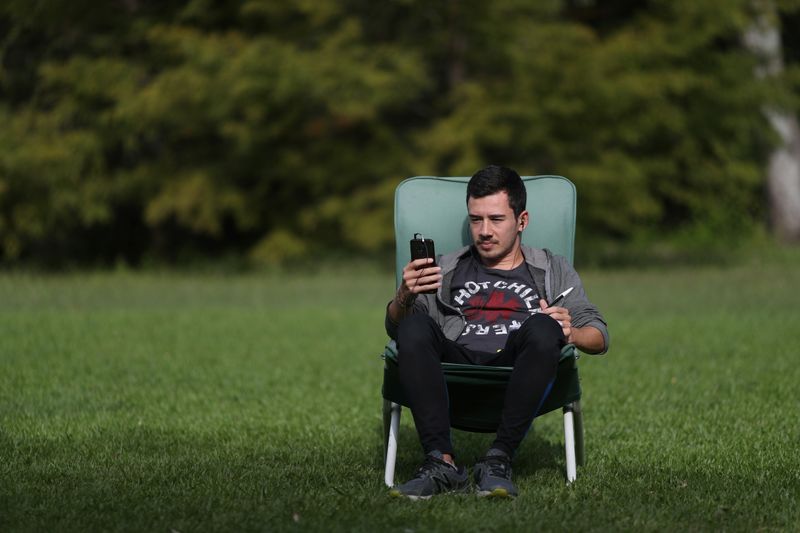By Lucila Sigal
BUENOS AIRES (Reuters) - Argentines, therapy-mad at the best of times, are finding ways to bring their shrinks into their homes via phone calls and conferencing apps like Zoom as they grapple with anxiety amid a nationwide lockdown aimed at stopping the spread of the coronavirus.
The South American nation, which World Health Organization data shows has one of the highest numbers of psychologists per capita in the world, has been under a government-imposed quarantine since mid-March, which is set to last until at least April 26.
"We are receiving many calls, the situation opens many new doors," Claudia Borensztejn, president of the Argentine Psychoanalytic Association (APA), told Reuters, adding consultations were almost all about the current coronavirus outbreak.
"Many are due to panic attacks, anxiety about confinement, insomnia, and anguish over economic issues."
A culture of therapy is well-established in Argentina, with many people making a trip to their psychologist's office, said Borensztejn. Now those sessions are happening remotely.
"We're 'entering' patients' houses, which would never have happened previously," Borensztejn said.
Amid the global outbreak, which has led to nearly 2 million confirmed cases and more than 120,000 deaths, the WHO has warned countries that the crisis is "generating stress" worldwide.
Argentina moved early to impose social distancing, helping slow the rise in cases, but the measure has kept people indoors and hit the economy. Argentina has around 2,277 confirmed coronavirus cases and 101 deaths.
Borensztejn's association has opened a free phone line to serve patients in emergencies, referring them to professionals who can take new cases and offer further treatment. She says many calls for help have come from doctors themselves.
A regular with her therapist in the capital Buenos Aires, Romina, a 47-year-old businesswoman and mother of two young children, wants to continue her therapy sessions at home - though finding a quiet space to talk isn't always easy.
"I go to the car so I'm not distracted and so I have more privacy," said Romina, who preferred to use only her first name. She uses a cell phone, which she said was easier than a computer.
Psychology - and the psychoanalysis discipline in particular - is so embedded in Argentine culture that it's common to hear therapist terms used in discussions on the streets or in schools.
The country has around 222 psychologists per 100,000 people, according to a 2017 WHO mental health report. That compares to less than 30 in the United States, 49 in France, 12 in neighboring Brazil and 103 in Australia.
"It makes me think we are a population that is more in touch with our own difficulties and hardships, and that is why we look for help," said Buenos Aires-based psychoanalyst Marisa Chamizo.
Psychologists reported that denial of the crisis has been a major issue for patients, especially at the beginning of the quarantine, with people often refusing to believe it would impact them.
"Others enter an echo chamber of information that comes from the media and have extreme reactions that become damaging," said Roxana Meygide Schargorodsky, a psychoanalyst in the capital.
Romina, who has been in therapy for years, said many of her current sessions address the pressures of balancing work, childcare and housework, along with the stress of isolation.

"To be honest there have been times when I haven't been okay," she said. "The session helped me get things off my chest. That's just the reality of the quarantine."